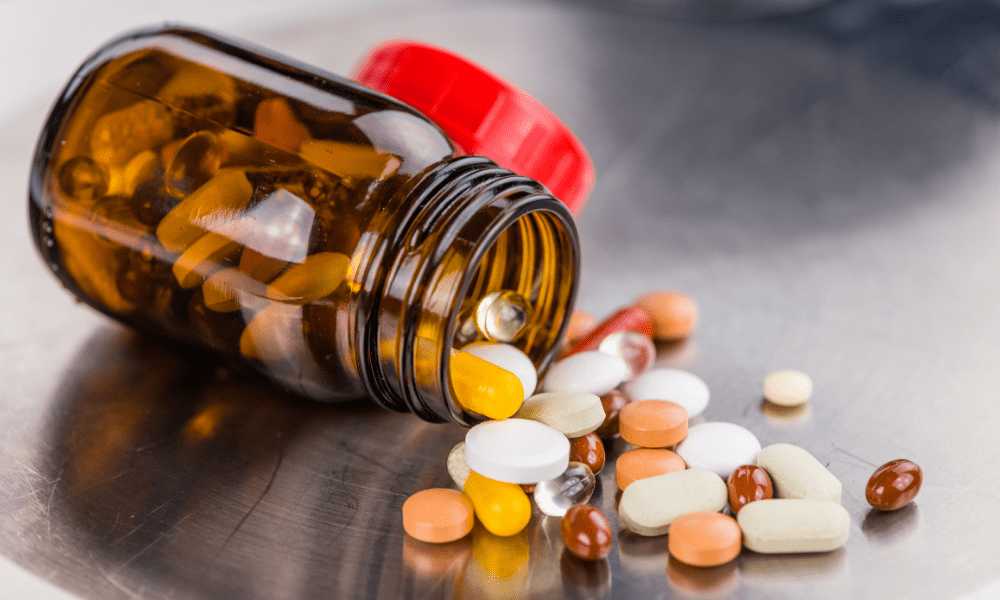If you are interested in your health, you may be taking nutritional supplements or have already thought about it. Supplements can be a great way to provide your body with nutrients that are often lacking in the diet. But how do you make sure that these supplements are of high quality? That's why we wrote this guide for you.
IT'S WORTH READING!
AT THE END OF THE ARTICLE WE WOULD LIKE TO GIVE YOU A LITTLE JOY WITH A VOUCHER!
What are dietary supplements?
Because food supplements are considered food, they are subject to the extensive legal regulations that also apply to all other foods. There are also other, specific regulations regarding composition and labeling. The regulations of German law can be found in the Food Supplements Ordinance (NemV) [1] , and at European level the requirements are contained in Directive 2002/46/EC. [2]
The short version: According to §1 NemV, food supplements are foodstuffs,
- intended to supplement the general diet,
- consist of nutrients (vitamins and minerals) [3] or other substances with nutritional or physiological effects and are in concentrated form and
- placed on the market in dosed form for consumption in measured small quantities.
So much for the legal side.
The different dietary supplements
There is a wide range of substances that are marketed as dietary supplements. They come in a variety of forms. You can take them as capsules, tinctures, liquids, powders, and even gummy bears.
Below is a brief overview of the most commonly used materials:
Vitamins
Vitamins are essential nutrients that your body needs to function properly and stay healthy. They help regulate vital metabolic functions, including growth, nerve function, and digestion.
A distinction is made between fat-soluble and water-soluble vitamins. Fat-soluble vitamins dissolve - as their name suggests - in fat and can be stored by your body. These include vitamin A, vitamin D , vitamin E and vitamin K.

Water-soluble vitamins dissolve in water and are not easily stored by the body (vitamin B12 is an exception). These include vitamin C and the B vitamins . The latter should always be in the active form, otherwise your body cannot use them well.
Minerals
Minerals are inorganic elements that are important for certain body functions, such as growth, bone health and fluid balance.
Antioxidants
Antioxidants are chemical compounds that fight free radicals and thus reduce cell damage.
The basic idea behind dietary supplements is that they should complement nutrients or other substances in food, not replace them. This means that even when taking supplements, it is important to ensure you have a varied and balanced diet.
Food or supplements?
The basic principle still applies: To ensure that you meet your vitamin and mineral needs, you should eat a variety of healthy foods.
Finally, different foods contain different amounts and combinations of nutrients. For example, fresh fruits and vegetables contain a lot of vitamin C, while leafy greens are an excellent source of vitamin K. [4] [5]
In addition to vitamins and minerals, foods also contain other essential nutrients, such as protein, healthy fats and fiber - all of which are needed for overall health and optimal body function. [6]
In addition, plant foods in particular are rich in antioxidants and phytochemicals, which have been linked to benefits in reducing inflammation and protecting against chronic diseases. [7] [8]
Dietary supplements do not (yet) provide the same nutritional benefits. Since they are intended to complement - not replace - a healthy diet, they usually only provide concentrated amounts of individual nutrients. [9]
However, individuals with nutrient deficiencies, increased nutrient needs due to physical activity, or those at increased risk for inadequate nutrient intake may benefit from taking various dietary supplements.
So who needs nutritional supplements?
There are certain cases where taking dietary supplements not only makes sense, but may even be necessary. People who can benefit from supplements include [10]
- Adults or children with diagnosed nutrient deficiencies
- Adults or children with limited access to fresh food
- Women who are pregnant or breastfeeding [11]
- People who do a lot of sports
- People with intestinal diseases
- People who have an increased need for nutrients due to taking certain medications
- People who have undergone bariatric surgery, such as gastric bypass
- Some vegans and vegetarians [12]
However, due to the decreasing nutrient density in natural foods, even many people who eat a healthy diet and consume a lot of fresh food are often not optimally supplied with essential nutrients.

How do you recognize high-quality preparations?
There are countless providers who offer you their nutritional supplements on the Internet. Unfortunately, there are also a few black sheep among them who either sell inferior substances at excessive prices or try to rip you off in other ways.
However, if you consider the following points, you increase the chance of finding high-quality products from reliable and certified suppliers:
All ingredients are also listed on the label
You should always know exactly what you are taking. That's why transparency is essential. The supplement should have a detailed ingredient list. If not, that's a bad sign and an indication that the manufacturer has something to hide.
Free from toxic extraction residues
Substances such as methanol, acetone or n-hexane are used as solvents in the manufacture of some preparations. In the best case, they are not contained in the finished product and there is no risk of your body being additionally burdened with them.
No release agents
Although release agents such as magnesium stearate and silicon dioxide are officially considered harmless and are often added to dietary supplements, it has not yet been well researched whether these additives can be harmful in the long term. Studies show, for example, that silicon dioxide can damage the intestinal mucosa. [13]
Without dyes such as titanium dioxide
Titanium dioxide (E117) has no other purpose in food than to make it look better. Nanoparticles of titanium dioxide under 100 nanometers, which can penetrate cells, are problematic. In the food sector, titanium dioxide can contain up to 50 percent nanoparticles, while in the pharmaceutical sector there is a leeway of one to three percent nanoparticles.
Titanium dioxide can be absorbed through the digestive tract, skin and respiratory tract. The effects of nanomaterials on humans and the environment are often still completely unclear.
Without sweeteners
Sweeteners are often considered a healthy alternative to sugar. However, they are very controversial because they can disrupt the balance of the intestinal flora. [14]
Without gelling agent
Gelling agents such as carrageenan are also often found in dietary supplements. The effects of carrageenan on humans have not been well studied. However, animal studies and studies on human cells indicate that it can weaken the intestinal barrier and cause inflammation in the intestine. [15] [16]
Without binding agents
Polyethylene glycol (PEG for short) is often referred to as macrogol in the pharmaceutical industry. It is used as a binding agent in medicines and cosmetics. However, PEG is also suspected of being harmful to the human body.
Free from artificial preservatives
Although preservatives such as sorbic acid are officially considered safe and are approved as food additives, they can still cause allergy-like symptoms in some people.
Free of nanoparticles
Too little is known about whether nanoparticles are toxic to nerve cells and tissue. However, there is increasing evidence that nanoparticles in polluted air can have a negative effect on our brain.
Manufactured and bottled in the EU
It is best if the preparations come from a manufacturer in the EU or, even better, from Germany. German producers must meet the highest requirements and their products are regularly analyzed by independent laboratories to ensure consistently high quality. To be on the safe side, you should look for certifications according to HACCP, GMP / ISO 22000 2005.
Free from impurities - laboratory tested
Make sure that the dietary supplement has been tested for heavy metals, for example, and that it is free from other contaminants.
High-quality packaging
Brown glass serves as a light protection to ensure better durability of light-sensitive contents. The brown glass absorbs most of the ultraviolet radiation and thus protects the contents from light and damage.
Free from plasticizers
Plasticizers such as bisphenol A (BPA) are not entirely harmless to health. BPA has an estrogen-like effect and can disrupt the hormonal balance. It is also linked to infertility, diabetes and breast cancer. [17] [18]
Free from allergens
Many preparations contain allergens and substances that easily cause intolerance, such as gluten, lactose and histamine. Such ingredients are completely unnecessary and you should avoid them.
Vegan or vegetarian
If you follow a vegan or vegetarian lifestyle, you should make sure that the product does not contain any animal products.
This is a very long list and unless you are a chemist, you will probably have a hard time identifying all of these substances on the ingredients list. In general, a short ingredients list is a good sign. It can also help to find a retailer you trust who you know focuses on quality and avoids unnecessary ingredients.
Conclusion: It depends on what’s inside
Good nutritional supplements are one way to meet your daily nutritional needs.
This is especially true when there are nutrient deficiencies, for example in diseases that lead to malabsorption. But they are also useful when there is insufficient access to food and in certain phases of life, such as pregnancy.
People with a special lifestyle and diet, such as vegetarians and vegans, also benefit from supplements. And even among people who eat a healthy and varied diet, nutrient deficiencies are not uncommon.
When buying, make sure to check which nutritional supplements meet high quality standards to protect yourself from black sheep and to ensure that you only give your body high-quality supplements.
AS PROMISED, YOU WILL RECEIVE A 10% VOUCHER ON OUR Vitamin B complex , vitamin B complex forte , vitamin C , vitamin D ,magnesium , calcium , potassium , zinc & copper .
SIMPLY COPY THE CODE MIKRO+V10 AND ENTER IT AT CHECKOUT.
Click here to shop
[1] http://www.gesetze-im-internet.de/nemv/NemV.pdf
[2] https://eur-lex.europa.eu/legal-content/DE/TXT/PDF/?uri=CELEX:02002L0046-20170726&qid=1545903950901&from=DE
[3] https://www.fda.gov/consumers/consumer-updates/fda-101-dietary-supplements
[4] https://www.ncbi.nlm.nih.gov/pmc/articles/PMC3783921/
[5] https://www.ncbi.nlm.nih.gov/pmc/articles/PMC3321250/
[6] https://www.ncbi.nlm.nih.gov/pmc/articles/PMC3471136/
[7] https://www.ncbi.nlm.nih.gov/pmc/articles/PMC5789319/
[8] https://www.ncbi.nlm.nih.gov/pmc/articles/PMC6021739/
[9] https://www.ncbi.nlm.nih.gov/pmc/articles/PMC6366563/
[10] https://www.ncbi.nlm.nih.gov/pmc/articles/PMC4109789/
[11] https://www.cdc.gov/breastfeeding/breastfeeding-special-circumstances/diet-and-micronutrients/maternal-diet.html
[12] https://pubmed.ncbi.nlm.nih.gov/24667752/
[13] https://pubmed.ncbi.nlm.nih.gov/29668341/
[14] https://academic.oup.com/advances/article/10/suppl_1/S31/5307224
[15] https://pubmed.ncbi.nlm.nih.gov/11675262/
[16] https://pubmed.ncbi.nlm.nih.gov/22579587/
[17] https://www.ncbi.nlm.nih.gov/pmc/articles/PMC1332699/
[18] https://www.researchgate.net/publication/332345741_The_Impact_of_Bisphenol_A_on_Fertility_Reproductive_System_and_Development_A_Review_of_the_Literature

















